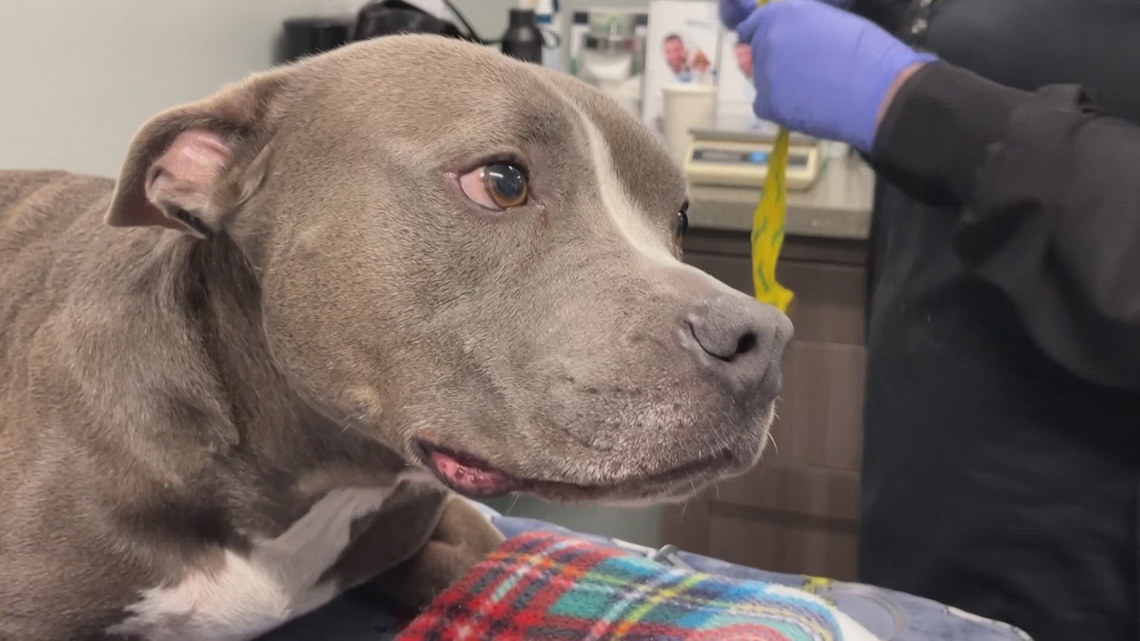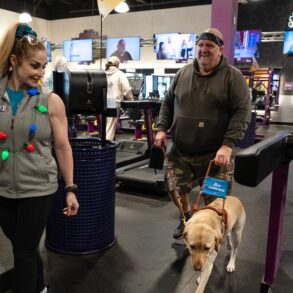
Stanley received a life-saving blood transfusion when he was younger, and now he’s giving back by donating his own blood.
CLEARWATER, Fla. — A three-legged pit bull named Stanley is saving lives as a canine blood donor at Blue Pearl Animal Hospital in Clearwater, Fla.
Struck by a car as a puppy, Stanley received a life-saving blood transfusion, and now, at five years old, he’s giving back by donating his own blood —18 times so far, enough to save nearly 54 dogs.
Stanley’s owner, Jen Joern, brings him in every few months for donations.
“He feels great. I feel great as a result of it,” she said. “So many people I talk to had no clue that dogs can donate blood. That’s why we’re here, sharing the love and spreading the word.”
Stanley’s universal blood type makes him an ideal donor for dogs of any breed.
“Just like people, pets need blood for trauma or surgery. Unfortunately, there’s a natural shortage of blood products,” said Lenore Bacek of Blue Pearl.
She added that Stanley enjoys the process, wagging his tail and receiving treats during each visit.
Each time his blood is used to save another dog’s life, Jen receives an email notification — a testament to her beloved pet’s impact.
She and the hospital staff hope Stanley’s story inspires others to consider their pets as donors.
“He is a hero,” Jen said proudly.
In January of 2024, Ready Pet GO! visited VCA Great Lakes Veterinary Specialists in Warrensville Heights to talk to them about blood donation for pets.
At the time, veterinarians were sounding the alarm about a shortage in their blood bank reserves.
“We always want to make sure we have enough in the hospital because it’s quite common that we are giving transfusions,” Dr. Katie Frantz told us.
There are many reasons why your pet might need blood, starting with trauma, an accident or surgery – whether planned or an emergency.
Some autoimmune diseases and clotting disorders can require transfusions too.
VCA Great Lakes uses blood banks to stock its supply, but also relies on pre-screened pets to donate in a pinch.
For dogs to donate, they should be over 50 pounds and between the ages of 1 and 7 (some banks may permit dogs as old as 8). They must be up to date on all vaccines and have a friendly disposition. No one likes needles, but pets must be able to tolerate these types of veterinary appointments.
Much of the same goes for cats, but they should weigh at least 4.5 kg or about 10 pounds. The blood type in greatest demand for dogs is DEA 1.1 – negative. Most cats are type A, but Dr. Frantz says “B” is always welcome.
Ask your veterinarian if your pet would be a good candidate for blood or plasma donation. If the practice you visit doesn’t have its own blood bank, staff may be able to recommend one in the area.
Sometimes veterinarians collect blood for regional blood banks, ensuring that you won’t have to travel far if your pet becomes a donor.
More Ready Pet GO! stories
This post was originally published on this site be sure to check out more of their content.









































